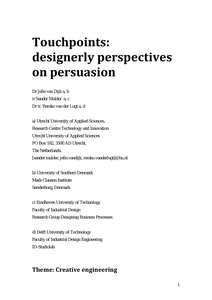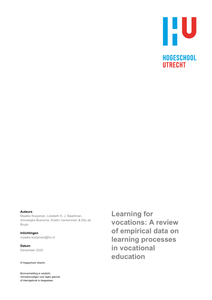Our approach builds on both the design traditions of participatory design and embodiment. We attempt to connect these traditions to the existing body of knowledge on persuasion. First we describe some basic theoretical concepts and infer how they influence persuasive design. Then we present a basic framework with which we intend to address the different abstraction layers involved. Finally, we discuss the principal differences and meeting areas between the disciplines of design and communication, ending up with some considerations for a persuasion toolbox that is intended to help communication professionals and designers effectively design behavior change interventions that fit the messy lives of people in the real world
DOCUMENT

The purpose of the paper is to start a dialogue about differences between Western and Eastern cultures in the way they conceptualize knowledge and discuss the implications of these differences for a global intellectual capital (IC) theory and practice. A systematic metaphor analysis of the concept of knowledge and IC is used to identify common Western conceptualizations of knowledge in IC literature. A review of philosophical and religious literature was done to identify knowledge conceptualizations in the main streams of Asian philosophy. Fundamental differences were found in the way knowledge is conceptualized. In Western IC literature common metaphors for knowledge include knowledge as a thing and knowledge as capital. In Asian thought, knowledge is seen as unfolding truth based upon a unity of universe and human self and of knowledge and action. The research was performed on a limited sample of literature. More research is needed to identify how knowledge is conceptualized in the practice of doing business in Asia and to test the effects of introducing IC theories to Asian businessmen and managers. Moreover, it might be questionable whether different types of resources (Western management literature on IC and Asian cultural philosophies) can be put in a comparative perspective to extract conclusions out of it. This methodological starting point has its confinements, but is plausible partly as long as IC theories originating from an Asian background are still missing, partly as far as philosophical notions within Western IC publications are contrasted with Asian notions of knowledge. Despite this restriction we would like to emphasize that Western conceptualizations of knowledge, embedded in terms like intellectual capital and knowledge management, can not be transferred to Asian business without considering the local view on knowledge. Asian conceptualizations of knowledge should play an important role in the further development of a knowledge-based theory and practice of the firm. We choose deliberately to contrast Western philosophy with cultural and religious connotations in Asian philosophy, as the underlying paradigm is strongly influenced by these notions. This is clearly perceivable in revivalist and reformist tendencies in Buddhism, Hinduism and Islam. Religious notions within these traditions have a strong paradigmatic function in a cognitive and normative sense. Not only in anthropology but also in epistemology, contemporary Asian thought is dominated by a discourse deeply embedded in religious and cultural traditions, in which the dimensions of 'nature', 'subjectivity' and 'history' have well defined boundaries. Anthropologically and epistemologically, all spheres of human reality are analyzed and described within the perspective of an integral and monolithic unity, in which all dimensions and spheres of being are bound. In Western philosophy these spheres of being have been separated from religious notions because of a longstanding secularization due to which religion and culture, metaphysics and philosophy have become separate disciplines.(Boom, 1993)
DOCUMENT

This book explores inspirational entrepreneurial activities in the tourism industry of Ladakh, India. It particularly looks at ways to develop an entrepreneurial yet environment-friendly tourist destination. The book starts off with in-depth historical reflections of entrepreneurship and tourism in one of India’s fastest growing tourist destinations. Subsequently, the book studies the unique entrepreneurial challenges and opportunities in Ladakh’s extreme resource-scarcity and remote context based on empirical evidence from entrepreneurs and stakeholders in the tourism industry. In addition, a broad overview of contemporary entrepreneurial activities in the tourism industry in Ladakh is presented, underscoring the importance of indigenous knowledge and cultural traditions for developing sustainable tourism. Based on qualitative data analyses and literature reflections, this book provides scholars, students, professionals and policymakers an alternative view on entrepreneurial activities in the tourism industry of an ecologically jeopardized region.
MULTIFILE
This article reports on a literature review on empirical research investigating learning for vocations in the context of vocational education. We included 36 studies in which learning for vocations is empirically studied. Learning for vocations is characterised based upon prevalent research traditions in the field and framed from the perspective of vocational education and organised learning practices. This framing and characterisation directed the search terms for the review. Results show empirical data on vocational learning and illustrate how learning processes for the functions of vocational education - vocational identity development, development of a vocational repertoire of actions, and vocational knowledge development - actually take place. The review further shows that, empirical illustrations of learning processes that occur in the context of vocational education and organised learning practices are relatively scarce. The findings can be typified in relation to our theoretical framework in terms of three learning processes, that is learning as a process of (a) belonging, becoming, and being, (b) recontextualization, and (c) negotiation of meaning and sense-making. We argue that more empirical research should be carried out, using the functions of vocational education and the three learning processes to better understand vocational learning.
DOCUMENT

Design and research are two fields of knowledge that each has its traditions, methods, standards and practices. These two worlds appear to be quite separate, with researchers investigating what exists, and designers visualising what could be. This book builds a bridge between both worlds by showing how design and research can be integrated to develop a new field of knowledge. This book contains 22 inspiring reflections that demonstrate how the unique qualities of research (aimed at studying the present) and design (aimed at developing the future) can be combined. This book shows that the transdisciplinary approach is applicable in a multitude of sectors, ranging from healthcare, urban planning, circular economy, and the food industry. Arranged in five parts, the book offers a range of illustrative examples, experiences, methods, and interpretations. Together they make up the characteristic of a mosaic, each piece contributing a part of the complete picture, and all pieces together offering a multi-facted perspective of what applied design research is, how it is implemented and what the reader can expect from it.
MULTIFILE

The research examined the ways in which Student Generated Video supported the learning process on the course ‘Levensbeschouwing’ (Life Philosophy) on the third year on the teacher training course at Inholland in Amsterdam. The central question examined was: In which ways does the student generated video on the Inholland course ‘Life Philosophy’ contribute to students gaining insight, developing deeper knowledge, and achieving the course learning goals? The 30 students on the course participated in the research. During the course, they were involved in creating three video interviews per project group that examined the question of life philosophy from the perspective of personal life, life philosophy traditions and school life. Video production was segmented into four phases; pre-production, production, post-production and reflection. At each phase, students answered short open questions online, and on the final day completed a survey. A group of seven students participated in a group interview on the final day.
DOCUMENT

Le chevalier delibere (1483) by Olivier de la Marche has an extensive hermit scene: the hermit receives the author, Acteur, gives him food and drink and instructs him in the important issues of life. Le chevalier delibere thus stands in two main Western European literary traditions: stories about hermits as such (who do or do not provide travellers with food and shelter) and stories in which food and drink have an allegorical function. This paper will discuss both traditions, without attempting to cover all hermit stories or all allegories about food and drink.
DOCUMENT

This paper adopts a problematising review approach to examine the extent of mitigating climate change research in the sustainable tourism literature. As climate change has developed into an existential global environmental crisis and while tourism's emissions are still increasing, one would expect it to be at the heart of sustainable tourism research. However, from a corpus of 2573 journal articles featuring ‘sustainable tourism’ in their title, abstract, or keywords, only 6.5% covered climate change mitigation. Our critical content analysis of 35 of the most influential papers found that the current methods, scope and traditions of tourism research hamper effective and in-depth research into climate change. Transport, the greatest contributor to tourism's emissions, was mostly overlooked, and weak definitions of sustainability were common. Tight system boundaries, lack of common definitions and incomplete data within tourism studies appear to hamper assessing ways to mitigate tourism's contribution to climate change.
MULTIFILE
About this publication: Computer mediated interpersonal interactions are defining our daily lives as we know it. Studying this phenomenon with various methodologies, across different cultures and traditions is a crucial component in understanding social ties. This book brings together articles that approach online dating from a range of cultural and critical perspectives.The research decodes the level of engagement and manner of approaching online dating in various countries such as France, India, China, Turkey, Cuba, USA and Portugal. Mapping the history of dating and courtship shows the evolution of these practices even before the introduction of the online medium and traces parallels and differences between old and new traditions.
MULTIFILE
